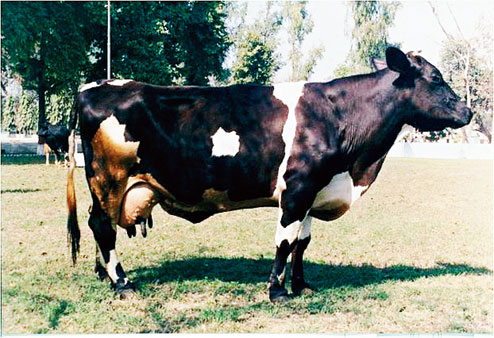
New Delhi, Aug. 9: India's military farms set to shut down in three months may be compelled to auction their elite cross-bred Frieswal cows that produce the country's highest milk yields to commercial dairy farms, livestock scientists said yesterday after a meeting with defence ministry officials.
The scientists said the Indian Council of Agricultural Research (ICAR) could accommodate about 1,000 of over 20,000 Frieswal cows in 39 military farms across India to be shut by November this year under a decision taken by the cabinet committee on security.
Twelve of the 39 farms will be shut down by August 15 while the rest over the next three months, an army spokesperson said yesterday. He could not immediately provide a list of the 12 to be closed this month.
Besides serving as a source of milk for armed forces, Frieswal cows are also a source of superior germplasm propagated through artificial-insemination to sustain high milk yields to farmers across India.
Office bearers of the All India Federation of Defence Workers had last week expressed concern about some 2,000 staff on the farms that are located in Ambala (Haryana), Bengdubi (north Bengal), Jhansi, Kanpur, Lucknow, Meerut, Pimpri, and Ranchi, among other cantonments.
At yesterday's meeting, senior defence ministry and army officials met ICAR scientists to discuss strategies to manage the Frieswal cows, a cross between the Netherlands' Holstein-Friesian and India's native Sahiwal developed over the past 30 years by the military farms and ICAR.
Scientists say the success of the cross-breeding programme itself poses a challenge to its continuity. "We fear the military farms will be forced to auction the cows because of lack of alternative accommodation," a senior ICAR scientist present at the meeting told this newspaper.
The military farms have offered the cows to state animal husbandry and livestock departments, but they're unlikely to be able to take them, the scientist said, because "they have their own interests and mandates - not Frieswal".
Some scientists are hoping commercial dairy farms will be able to absorb the Frieswal cows that yield on average of about 3,600 litres per lactation compared to the national average yield of 2,000 litres.
"But we don't have many large commercial dairy farms with cows, mainly because buffalo milk is preferred in many parts of the country," said an ICAR scientist. "Farms willing to take up hundreds of cattle will be hard to find."
Another option would be for about 5,000 of the Frieswal cows to be maintained by a network of animal husbandry institutions over a total of about 1,000 acres of land and an annual budget of about Rs 150 crore. "These are hypothetical solutions, even if the money was available, the land is an issue," a scientist said.
The ICAR has told the military farms that it could keep about 1,000 of the highest-yielding cows in its own institutions, another scientist at the meeting said. "We'll also keep 300 elite bulls for propagation of the germplasm," the scientist said.
The Frieswal initiative began as a project between the ICAR and the military farm school in Meerut in 1987 to study genetic aspects of Holstein-Sahiwal crossbreeds and evolved into one of the world's largest cross-breeding programmes.
"I think we're going to see the outcome of a 30-year project slowly vanish," an ICAR scientist said. The cows cost about Rs 150 to Rs 200 a day to maintain and, the scientist said, most farmers in India will be unable to provide them the nutrient and appropriate management they require.










